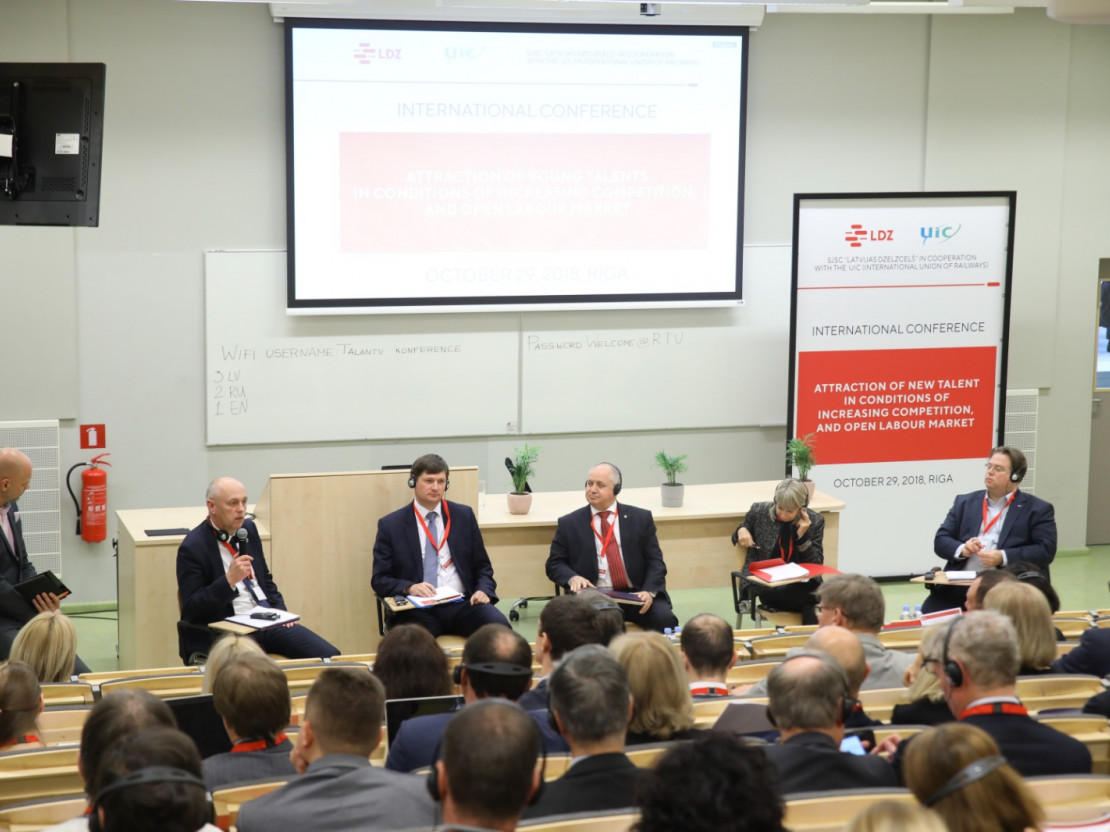
According to the surveys, the most significant working environment factors of the employees of the younger generation in the order of priority are flexibility, attitude of the management and colleagues, and competitive remuneration follows just after these factors. On the other hand, expectations of remunerations of the young specialists are frequently non-compliant with the labour market. How to attract the talents necessary for the sectors in this situation and to promote their growth – these were the topics of discussions of the experts of human resources management from Latvia and other countries on Monday, 29 October, at the conference “Attraction of New Talents Under the Circumstances of Growing Competition and Open Labour Market”, organised by the SJSC (VAS) “Latvijas dzelzceļš” (LDz) and the International Union of Railways (UIC).
Frequently, solutions for the problems related to attraction of new talents and development of leaders can be found inside the company itself – how precisely the wishes the company expect from the employees are defined and if it is possible to satisfy these wishes by the development of competences and skills of the company’s current employees, or the specialists should be attracted from outside.
Dr. Janine Peep, Director of “JP Research & Consulting” and conference speaker from Australia stressed that the talent, which has lately become a frequent object of discussion within the context of human resources in relation to the working environment, means value in the historical expression of this word (certain units of money were called talents in the Ancient Rome), and it should be perceived as such. Thus, talent management actually means human resources management on the basis of the value thereof. However, the greatest challenge is uniform understanding on what the employer really needs and what skills can the employee deliver to the company.
J. Peep stressed the necessity to define the strategically most significant positions in the company as the most significant aspect in the talent management and to formulate the skills, attitude and knowledge necessary therefor. “Selection of employees is frequently based on inaccurate idea of what the human is necessary for. Therefore, communication and careful preparation for the attraction of specialists,” said Ms. Peep. She shared an example of a company of transport sector, which, upon facing changes in market and technological challenges, redeveloped completely all job descriptions of specialists, defining new requirements and needs.
Whereas, Ms. Zane Čulkstēna, founder of the company “ERDA”, stressed that selection of employees was just a part of the talent management – significant part is also retention and motivation for development. Furthermore, retention of employees has a significant financial effect – she presented a methodology, which enables for accurate calculations of losses in monetary terms caused by loss of every employee and gain caused by retention of a satisfied employee in the company.
Creation of inner culture enhancing the satisfaction of employees plays significant role to attract and retain the employees. This factor is critical, when it comes to the youngest generations of employees, which want to associate themselves with something big and mighty and which spend their days on the social networks. This affects also the employee attraction process – employers must use modern digital solutions also in this field to make even the recruitment process exciting, stressed the expert.
SEB banka has similar experience, and Ms. Diāna Blumate, Head of the Marketing Department, introduced with the youthLAB programme created by the bank for the attraction of new talents. Training programme of young specialists has been implemented within the framework thereof by implementing specific innovative projects. Involvement in creation and development of new ideas is one of the ways to direct the wish of the generation of new talents to create something new and enjoy the work process to rational pattern, which is useful for the company, at the same time becoming familiar with and developing their skills.
At the end of the conference, the experts indicated that change of the image of the sector was one of the most important aspects to clear delusions of young people about the railwaymen professions (the spectrum of which has significantly grown) as hard and complicated ones, and to create interest to acquire them and to create careers in this sector. It should also be understood that there are different factors, which are significant for the employees of older generations and young people – stability is not a prior factor in the selection of job for the later ones. Instead, employers must be able to offer independence, flexibility and challenges. “Today young people have different way of thinking. We must show, why the railway sector is better than the other sectors to compete successfully with other sectors for the attraction of new talents,” stressed Mr. Jurijs Kulaženko, Rector of the Belarusian State University of Transport. Of course, it causes certain complications in the communication between the employer and employees of various generations, who need to be provided seemingly contradictive information at the same time.
Educational institutions and balance of the programmes thereof with the working environment and the needs thereof also plays significant role. Experts admitted that frequently offer of the institutions of higher education is not balanced with the needs of the entrepreneurs – experience-based knowledge is required, which educational institutions are not always able to provide. Mr. Aivars Strakšas, Vice-President of LDz, admitted – it takes time to create a talent from the young specialist, and it does not always correspond to the expectations of the new employee regarding his/her future in the company. “Upon graduation of an institution of higher education, the young individual is like an unprocessed diamond. It takes several years to turn the diamond into a brilliant,” compared A. Strakšas. Frequently it means that the employee does not receive such a remuneration or does not take such a job position for a while, as he/she has initially imagined. However, we can offer good working conditions, sense of safety, as well as various bonuses also during this time, and this, for example, is provided by the collective agreement concluded between LDz and the sectoral trade union.
Representatives of railway sector from Germany, France, Italy, Japan, Bulgaria, Slovenia, Norway, Russia, Belarus, Great Britain and even from Cameroon and Morocco participate in the conference “Attraction of new talents under the circumstances of growing competition and open labour market”.

